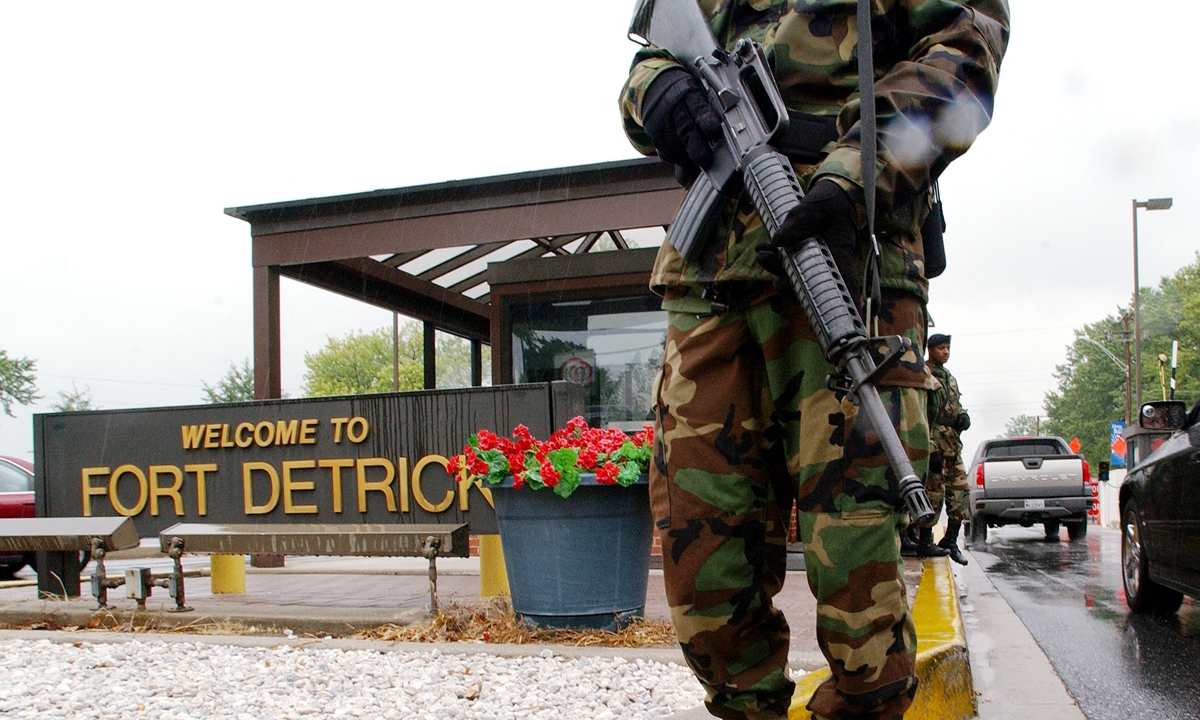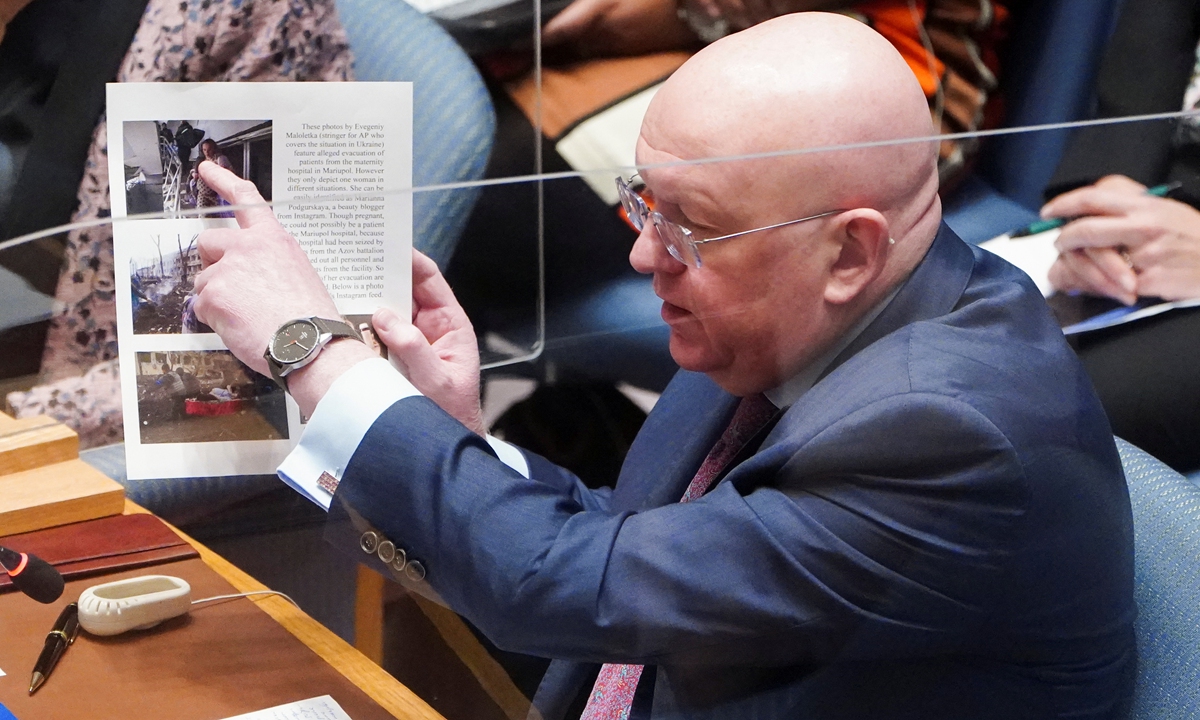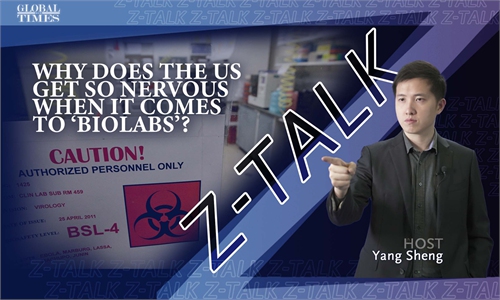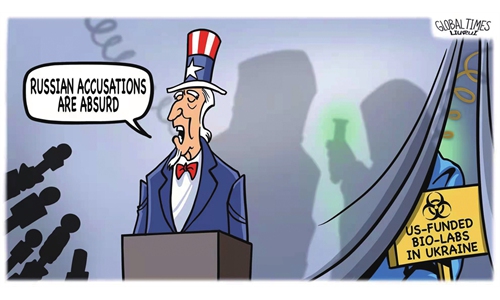US against 180+: Washington the solo dissenter to biological weapons verification regime in intl community

Military personnel stand guard outside the USAMRIID at Fort Detrick on September 26, 2002. Photo: AFP
Editor's Note:
The flames of the Russia-Ukraine military conflict have unveiled a dark side of the US' secret biological experimentation activities around the world. Although the US government has repeatedly claimed it is not developing biological weapons, numerous facts show that this claim is hardly convincing.
The US at first pushed for the conclusion of the Biological Weapons Convention (BWC) but then became the only country to oppose the establishment of a multilateral verification mechanism for the convention. Experts reached by the Global Times noted that hidden behind this flip-flopping is the US' calculations of domestic realities and interests, which is another nefarious attempt to seek global hegemony under its narrow view of security.
US says 'No' to BWC verification
As the world frowns at the three recognized weapons of mass destruction - nuclear weapons, chemical weapons and biological weapons, the US is happy to have so many of them.
It is well known that the US possesses nuclear weapons with the capacity to destroy the world multiple times. In the case of chemical weapons, "The US is the sole possessor state party of chemical weapons," said Chinese Foreign Ministry spokesman Zhao Lijian at a regular press conference on March 10. At the same time, the US is the only country that has so far opposed the establishment of a biological weapons verification mechanism.
As the cornerstone of international biological arms control, the BWC was opened for signature in 1972 and entered into force in 1975, with more than 180 states parties. It is the first international convention of the international community to ban an entire category of weapons of mass destruction, and together with the Geneva Protocol and UN Security Council Resolution 1540 (2004), constituting the basic arrangement of the international biological arms control system.
The lack of monitoring, verification and punishment for compliance by states parties to the convention has led to widespread international recognition of the need for a protocol that includes a verification mechanism. After years of negotiations, the draft Biological Weapons Convention Compliance Protocol, which integrates the positions of all parties, was formed.
However, in 2001, the states parties to the Convention suddenly discovered that years of effort had been in vain as "a new US administration with a demonstrated antipathy to arms treaties is about to block the final step," said Barbara Hatch Rosenberg, co-founder of American Scientists Working Group on Biological and Chemical Weapons.
At that time, the administration of then US president George W. Bush alleged that the US rejected the draft verification protocol because it had numerous problems and serious errors. Subsequently, at successive review meetings, the US clearly expressed its opposition to restarting the relevant negotiations.
The US was one of the countries that initially pushed for the BWC. Influenced by international and domestic political, scientific and cultural factors, US biological weapons policy is a strategic approach based on precise calculation and a fragile balance based on realism, said Wang Xiaoli, biological expert of the China Arms Control and Disarmament Association.
With the development of the times, especially the changes in biotechnology, this strategic orientation and fragile balance can easily collapse, Wang told the Global Times.

Russia's Ambassador to the UN Vasily Nebenzya shows pictures during the UN Security Council meeting discussing US biological warfare labs in Ukraine, on March 11, 2022. Photo: IC
US harvests labs & scientists after Soviet dissolution
After the Cold War ended, the US harvested a large number of bio-labs and scientists from the former Soviet Union with the excuse of "preventing bio weapons threats."
After the Soviet Union collapsed, Russia did not have enough money to destroy the nuclear and biological weapons inherited from the Soviet states.
In 1991, US senators Sam Nunn and Richard Lugar promoted related legislation, through which the Cooperative Threat Reduction Program (CTR) was set up to address these weapons of mass destruction.
The program was supervised by the Defense Threat Reduction Agency and included the Cooperative Biological Engagement Program (CBEP). Related efforts have been extended repeatedly by Washington and lasted for decades.
According to an article of the Bulletin of the Atomic Scientists in 2008, the initial focus of the program was on the nuclear weapons inherited by Belarus, Kazakhstan, and Ukraine and on Russia's nuclear weapons, materials, and facilities.
Following the successful denuclearization of Belarus, Kazakhstan and Ukraine, and with a bulk of the most pressing Russian nuclear proliferation threats resolved, CTR's efforts turned its focus to dealing with biothreats.
However, the CBEP gradually became different from what it was intended for. The US did not destroy all facilities storing dangerous pathogens in Soviet states, instead, it upgraded many labs. These labs, although located outside the US, are in fact controlled by Washington and their materials and research results have been transferred to the US, according to documents recently disclosed by Russia.
After the dissolution of the Soviet Union, tens of thousands of scientists lost their jobs. With the excuse to prevent these scientists from going to "rogue countries" for a living, the US established the Civilian Research & Development Foundation (CRDF) to recruit related scientists.
According to open materials, the US passed related legislation in 1992 and established the CRDF in 1995. Founders of the CRDF include public agencies like the US State Council and the US Department of Defense as well as private agencies such as the Open Society Foundations, founded by American billionaire George Soros.
At first, the US Department of Defense allocated $5 million for the launch of CRDF and Soros donated another $10 million. Yearly budget for the CRDF was about $10 million at the beginning. In 2000, then US president Bill Clinton proposed that the spending of the CRDF that year should be tripled from $64 million to $176.5 million.
US goes back on its words
In 2001, a decade after the end of the Cold War, the US made clear its opposition to the establishment of a multilateral verification mechanism for the BWC, probably because of its intensifying research on biological weapons and the improvement of its own biological research capabilities.
John Bolton, then US undersecretary of state for arms control and international security affairs, in 2002 explained three reasons why the US rejected the Draft Protocol to the BWC: first, it was based on a traditional arms control approach that will not work on biological weapons; second, it would have compromised national security and confidential business information; and third, it would have been used by proliferators to undermine other effective international export control regimes.
Biological arms control has its particularities, but the measures including declaration, visit and verification proposed in the Draft Protocol to the BWC are feasible and supported by most countries, Guo Xiaobing, a research fellow with the China Institutes of Contemporary International Relations, responded to the US' "explanation."
The US seems to have a skeleton in its closet in the field of biology, Guo said. The biological laboratories at Fort Detrick, for instance, severely lack transparency, and it is unclear whether the US is pursuing biological weapons under the guise of defensive biological researches, he added.
Wang believes that there are deeper reasons for the US' rejection of a verification regime. First of all, the US has put its domestic politics ahead of the common interests of the international community. Both the BWC and the Draft Protocol to the BWC are the result of the contracting parties maximizing international interests and seeking common ground while putting aside differences. But the volatile political climate in the US can easily break this fragile balance.
Secondly, the driving mechanism of the US to resolve the biological weapons issue has changed, Wang said. The development of biological technologies, including synthetic biology and gene editing, has prompted the US to reexamine the strategic value of biological weapons. In the name of protecting itself against bio-terrorism threats, the US has drastically increased its bio-defense budget. It becomes an important strategic goal of the US to maintain its superiority and hegemony in biotechnology, and to achieve absolute security in the field of biology.
Thirdly, out of the protection of the military and industrial interests of the US and its allies, the US is wary of the multilateral agreements on biological weapons arms control that require transparency and are governed by international laws, said Wang. And the lobbying of American biopharmaceutical and biotechnology industries pushes the US further away from the negotiating table of the verification protocol, he added.
US' credit deficits under dark records
Despite US President Joe Biden's recent solemn statement that Washington has no biological and chemical weapons in Europe, no one can take his statement at face value as the US has lost its credibility over repeated lies throughout the years. After World War II, the US sought to gain an edge in biological weapons research by making a secret deal with Japan to protect the Japanese war criminal, microbiologist Shiro Ishii who led Unit 731. Located near Harbin, Northeast China's Heilongjiang Province, and at the time occupied by Japanese invaders, Unit 731 was notorious for conducting Japanese biological warfare experiments. Ishii later served as a bioweapons consultant at Fort Detrick Biological Warfare Laboratories.
In addition, after the end of World War II, the US "recruited" a large number of Nazi scientists. One of them was Kurt Blome, director of the Nazi Biological Warfare Program.
Several US-funded biological laboratories have been found to have carried out deadly human experiments. The locations of Washington's overseas biological laboratories also overlap with the sites of many reported local incidents.
The US remains the only country in the world that still possesses chemical weapons. It also stands alone in opposing the establishment of the verification regime. The country has twice exceeded the time limit to destroy all its chemical weapons stockpiles despite repeated requests by the international community. It is also tight-lipped about research carried out in biological laboratories overseas.
Faced with Russia's evidence, the US simply tried to dismiss it as "disinformation." As Chinese Foreign Ministry spokesperson Zhao Lijian said, the US responses so far have been self-contradictory and perplexing.


